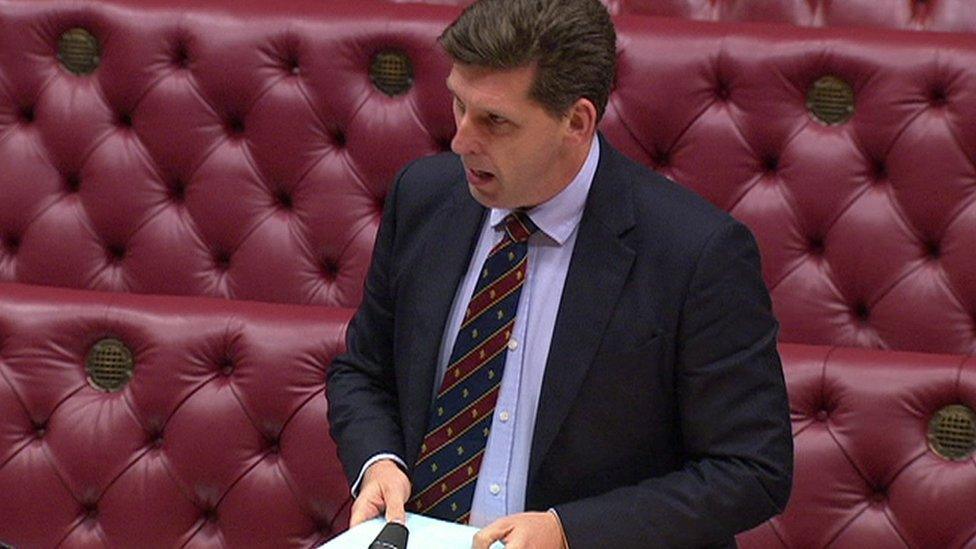'There are far too few nationalists in here' - minister
- Published
- comments

'There are far too few nationalists in here' - Wales Office Minister Lord Duncan
Think of a a maiden speech and the mind may fix on the image of a raw young MP, hands shaking with nerves as he or she tries to get their words out without stumbling.
But occasionally a maiden - the first parliamentary speech - is made by a government minister. Lord Duncan of Springbank, parliamentary under-secretary of state for Scotland and Wales, delivered his in the House of Lords on Monday evening.
"The phrase 'baptism of fire' springs to mind," he told peers as he responded to a debate on Brexit and devolution. He was responding to a report by a Lords committee, external that warned of the potential danger to the future of the UK posed by Brexit.
His thoughts on the devolution settlement caught my ear. "It is easy to look on it as unfinished business, but the question is: what would finish that business? How shall we bring together each of the constituent parts to create what needs to be a functioning constitution?" he said.
'Crocodile'
"We cannot simply keep feeding the crocodile and hope that it will eat us last. There needs to be a recognition of what we are for. What is our country and what shall be our constitutional settlement? We need also to recognise that each constituent part must play its role in that.
"We do that against the backdrop of Brexit, which makes the whole process considerably more difficult in terms of trying to achieve progress. However, I am well aware that we have to achieve that progress because without it we will be in a terrible situation."
He added: "It is important to stress that there is an existential threat to our nation. There is no question of that. One thing I would note in passing is that there are far too few nationalists in here. There needs to be more.
"That seems an odd thing, perhaps, for a unionist to say, but if we are to reflect the wider interests of our country, we must recognise that those voices need to be heard in both Chambers, not just in the House of Commons. That is perhaps not for me to create, but for others to look into; none the less, at this time, more than any other, we need those voices as part of the overall discussion that we are looking into."
'Standards'
Music to the ears, perhaps, of the former Plaid Cymru leader Lord Wigley, although Lord Duncan's comments were aimed more at Plaid's sister party, the SNP, which boycotts the Lords.
Lord Wigley highlighted one line in the report on Brexit: "No durable solution will be possible without the consent of all the nations of the UK" and its recognition "that common standards, which may be needed for the integrity of the UK single market, 'cannot be imposed top-down by the UK Government'."
That issue of common standards is at the heart of the current dispute between the UK and devolved governments, which say the plan to develop UK-wide frameworks in areas like farming is a "Westminster power grab".
Lord Duncan insisted the UK government had "no ambition to change in any fashion the powers currently exercised by the devolved administrations".
But he admitted the scale of the issue: "At the moment there are 111 areas in the Scottish legal world and 64 in the Welsh where again, we hope to collaborate to establish exactly where we can find a common framework, a common approach and the right outcome."